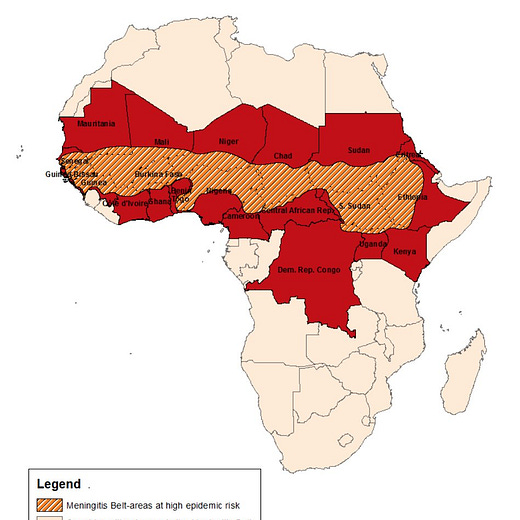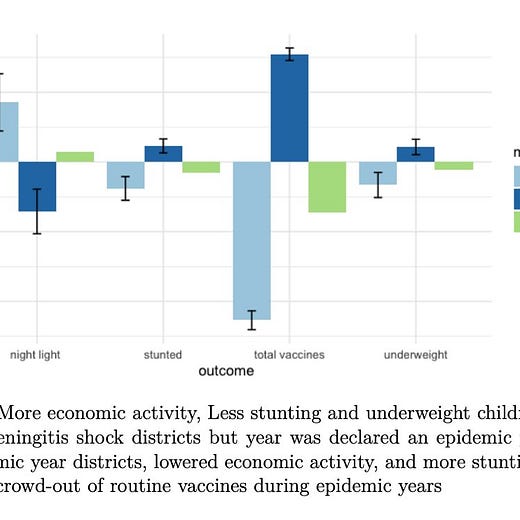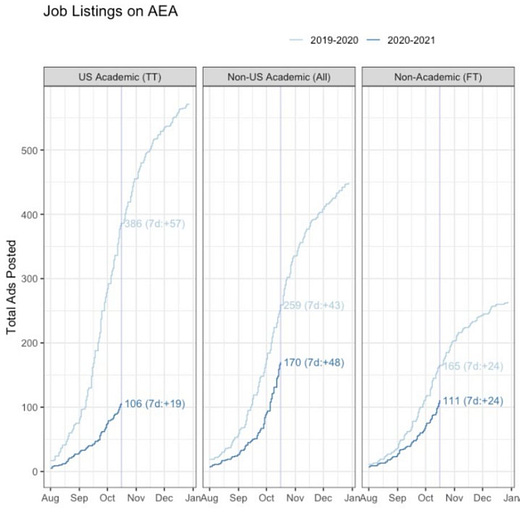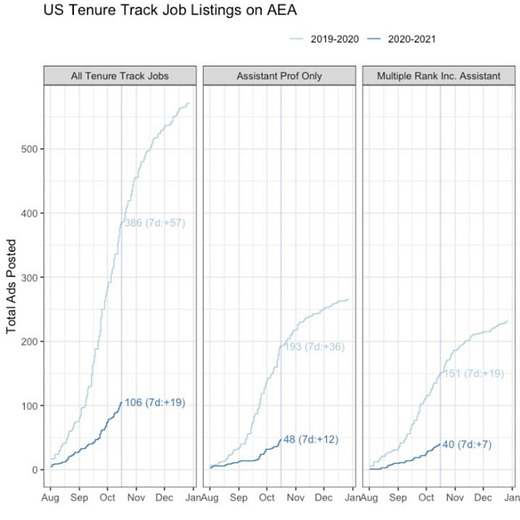Best of #econtwitter - Week of October 18, 2020
Oct 18, 2020
Welcome readers old and new to this week’s edition of the Best of Econtwitter. Thanks to those sharing suggestions, over email or on Twitter @just_economics.
Paper summaries

Pedro H. C. Sant'Anna@pedrohcgs
For all people doing IV in their work, this brand new paper seems *very* relevant!
arxiv.org/abs/2010.05058
One important takeaway msg is: Rule of 1st stage F stats > 10 can be very misleading.
Authors also give nice alternative inference tools that can “rescue” us all!

3:42 AM · Oct 14, 2020
317 Reposts · 1.15K Likes
^potentially a big deal. Funny/meme responses here and here and here; good explanation:

Jonathan Roth@jondr44
I’m glad to see a weak IV paper getting so much attention! Since I know a lot of ppl won’t read past the abstract, I thought it might be helpful to do a short thread on the paper. 1/

Pedro H. C. Sant'Anna @pedrohcgs
For all people doing IV in their work, this brand new paper seems *very* relevant!
https://t.co/CKjn3Zq9bS
One important takeaway msg is: Rule of 1st stage F stats > 10 can be very misleading.
Authors also give nice alternative inference tools that can “rescue” us all! https://t.co/HTbj360gel
3:42 AM · Oct 15, 2020
215 Reposts · 884 Likes

Matt Lowe@hmmlowe
🚨New Paper: Religious Revival and Social Order 🚨
Cultural beliefs are usually slow-moving. Not so with religious revivals: here beliefs change rapidly. [1/N]
osf.io/6kh9e/

7:24 PM · Oct 16, 2020
47 Reposts · 134 Likes

Justin Sandefur@JustinSandefur
The value of WHO surveillance and World Bank aid in the "Meningitis belt", by @belindaarch et al.
researchgate.net/publication/34…
Local outbreaks => big economic and health losses.
But if WHO declares a national epidemic, World Bank aid kicks in, all effects are reversed.


1:50 PM · Oct 17, 2020
13 Reposts · 46 Likes

Thiemo Fetzer@fetzert
🥳 Our paper #Tariffs and Politics: Evidence from #Trump's #tradewars is forthcoming @EJ_RES. The paper is joint with Carlo Schwarz @Unibocconi ( @Warwick_econ PhD). Paper is ➡️: bit.ly/3nP059U and ⬇️ a short🧵describing what we do and how the paper is novel... 1/

10:20 AM · Oct 15, 2020
19 Reposts · 134 Likes

Juan Felipe Riaño@JuanFelipeRiano
🚨 In this new @cepr paper with @felipev84 we document the negative long-term impact of conflict on economic development, using highly disaggregated and newly available data on bombing campaigns, satellite imagery and development outcomes.
\begin{thread}


CEPR @cepr_org
A new CEPR paper by @JuanFelipeRiano (@ubcVSE) & Felipe Valencia Caicedo reveals the severe negative long-term impact of conflict in #Laos on economic development, using new data on bombing campaigns, satellite imagery & development outcomes. Download > https://t.co/nqArf2BZan https://t.co/3XjaC1ef8e
8:39 PM · Oct 17, 2020
25 Reposts · 77 Likes
Public goods

Roberta Piermartini@RobiPiermartini
AAA For researchers: WTO has just made available a new structural gravity database! Covering manufacturing trade between 1980-2016. #gravity4trade #modellingtradepolicy Check it out at
wto.org
Structural gravity

9:46 PM · Oct 16, 2020
59 Reposts · 198 Likes
More on the Nobel
ICYMI, our special Nobel edition of the newsletter from earlier this week

Mohammad Akbarpour@akbarpour_
A coauthored thread: A lot has been said about the #NobelPrize2020 of Milgrom & Wilson, but @ShengwuLi and I would like to say a bit more. As two of Paul’s recent students, here’s our perspective on why auction theory is at the core of economic thinking. 1/14
11:37 PM · Oct 13, 2020
436 Reposts · 1.34K Likes
^recommended

Branko Milanovic@BrankoMilan
(Long thread--but worth reading)
I received lots of pushback (including some pretty nasty comments) on my tweets re. the most recent “Nobel Prize” in economics.
2:28 AM · Oct 13, 2020
992 Reposts · 2.63K Likes
^not recommended

Miguel Urquiola@m_urquiola
Fascinating thread on a Mexican grad student’s (acknowledged) contribution to multiple Nobel prizes. Who knows what he would have achieved had he remained in US universities, with all their pros and cons. Nice to see Ortega acknowledged though---economics has redeeming qualities!

Gerardo Esquivel @esquivelgerardo
Ahora con lo del Nobel de Economía a Wilson y a Milgrom ha emergido una historia fascinante y triste a la vez. Es la historia de un mexicano que influyó de manera significativa en una vertiente que ha producido varios Premios Nobel. Se trata de Armando Ortega Reichert. Abro hilo.
10:38 AM · Oct 17, 2020
59 Reposts · 280 Likes
Good discussions

Wojtek Kopczuk@wwwojtekk
Hello #EconTwitter. Some journals desk reject >50% of submissions. If there were no desk rejections and nothing else changed, we'd need twice as many referee reports. What is your preference (people with some experience with per review only please):
12:59 AM · Oct 17, 2020
2 Reposts · 8 Likes
^a particularly good reply:

Dominika Langenmayr@D_Langenmayr
@wwwojtekk Unpopular opinion: I think there should be more desk rejects or an option for referees to click "this paper should be desk-rejected" when asked to review. I sometimes know that the paper will be rejected after reading the intro, and still have to waste time on a full report.
9:16 AM · Oct 17, 2020
49 Likes

Arindrajit Dube@arindube
Here's some data on how economists have updated their priors over time in light of evidence.

3:31 AM · Oct 13, 2020
308 Reposts · 943 Likes

Maya Rossin-Slater@maya_rossin
A thread on virtual seminars, econ terminology, and inclusivity in the profession.
I recently had the fortune to attend a fantastic virtual seminar. The paper was excellent and the speaker was a wonderful economist and person. But, as it often does in applied micro, 1/7
2:31 AM · Oct 16, 2020
141 Reposts · 633 Likes

Andrew Althouse@ADAlthousePhD
As promised last week, here is a thread to explore and explain some beliefs about interim analyses and efficacy stopping in randomized controlled trials.
12:52 PM · Oct 16, 2020
125 Reposts · 309 Likes
Job market
What a disaster:

John Cawley@cawley_john
As of 2020-10-04, # of job openings on JOE for full-time academic jobs in the US is down 64.1% relative to same time in 2019. 2/6

5:39 PM · Oct 13, 2020
70 Reposts · 86 Likes

Andrew Lilley@andrewlilley_au
An update a month later: sad to see that US Academic jobs are still down 75%, nonUS recovered a little but still down 35%, US non academic jobs down 35%, US academic non tenure track jobs (postdocs etc) down 20%. Also, broken down by the type of academic job (AP/senior). jmdt



Andrew Lilley @andrewlilley_au
Some good news for JMCs on #EconTwitter. On a quick scrape of the AEA's job listings, the private sector seems to be holding at 90% of last year's listings at this point in time, and nonUS academic jobs are at ~65%.
(Bad news is that US academic jobs at ~35% as bad as expected). https://t.co/UxwWfZkJ4O
11:51 PM · Oct 16, 2020
2 Reposts · 6 Likes

Kelli Marquardt@KelliMarquardt
Hey Job Market Candidates, what's your favorite graph/figure from your JMP?! #EconTwitter
6:25 PM · Oct 16, 2020
7 Reposts · 31 Likes

